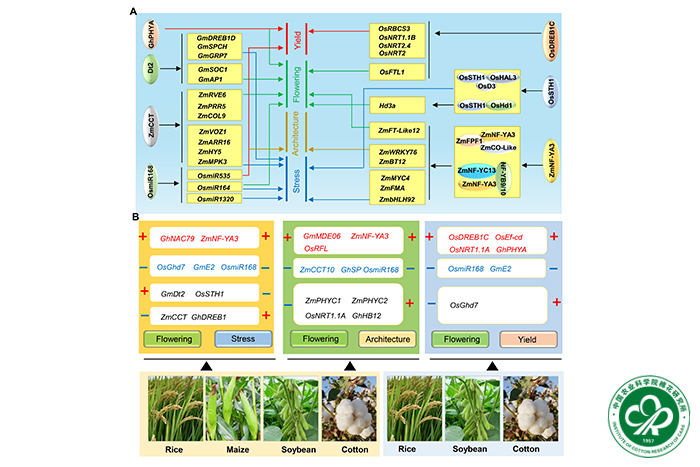- Location : Home» Newsroom
Fuguang Li Research Team from Institute of Cotton Research of CAAS Proposes Efficient Aggregation Breeding Strategy for Crop Excellent Traits
Recently, the Fuguang Li research team from the Institute of Cotton Research at CAAS elucidated the latest research progress and limiting factors in early maturation breeding of crops. They analyzed the mechanisms governing flowering and maturation in crops adapted to specific cultivation areas during domestication. They proposed a breeding strategy aimed at efficiently aggregating early maturation traits with various excellent agronomic traits through the influence of pleiotropic factors. This approach is of great significance for guiding crop breeding. The research results were published in the prominent botany journal "Trends in Plant Science "(IF=22.012) titled " Synergistic optimization of crops by combining early maturation with other agronomic traits"
Overcoming thegeographical limitations for crop cultivation and mitigating regional environmental and seasonal climate constraints heavily rely on achieving early maturation of crops. However, early maturation tends to have a negative correlation with traits such as yield and disease resistance, creating a challenge in simultaneously aggregating excellent traits in crop breeding technology.
The study thoroughly investigates the mechanisms governing flowering and maturation in both monocotyledonous and dicotyledonous crops that have adapted to cultivated regions during domestication. It also outlines technical strategies for accelerating breeding by regulating genes related to flowering and early maturation from a crop breeding perspective. Furthermore, the research discusses breeding strategies for effectively aggregating superior agronomic traits like early maturation, disease resistance, high yield, and desired plant architecture using pleiotropic genes. To address the current obstacles and limitations in crop breeding, the study proposes a new direction for crop breeding. This direction involves using gene editing technology to modify specific genes or their target gene promoters to block unfavorable trait regulatory pathways while preserving desirable traits. Additionally, the research suggests optimizing crop genetic transformation methods to establish an efficient, convenient, and genotype-independent crop genetic transformation system. Employing single-cell sequencing technology can help systematically identify the required excellent genes at a single-cell resolution. The research also emphasizes expanding the functional exploration of pleiotropic genes for broader application in agricultural production. Given the highly complex network system governing different agronomic traits, which involves various environmental factors, plant hormones, and transcription factors, the study underscores the need for further efforts to elucidate the regulatory mechanisms of different agronomic traits and their relationships. This will contribute to the discovery of new regulatory factors or the enhancement of known outstanding genotypes.
The first authors of this paper are Hang Zhao, a postdoctoral researcher at the Institute of Cotton Research of CAAS and an associate professor at Qufu Normal University, XianZhong Huang, a professor at Anhui Science and Technology University, and Zhaoen Yang, a researcher at the Institute of Cotton Research of CAAS. Fuguang Li and Xiaoyang Ge, researchers at the Institute of Cotton Research of CAAS, serve as the corresponding authors of this paper. The research received funding from several sources, including the National Key Research and Development Program, the National Natural Science Foundation of China, the Science and Technology Innovation Program of the Chinese Academy of Agricultural Sciences, and the Excellent Youth Fund of Henan Province, among other projects.
Original Link: https://doi.org/10.1016/j.tplants.2023.04.011
